Introduction
In recent years, avocados have gained popularity as a versatile fruit with numerous nutritional benefits. This versatile fruit is not only delicious but also a nutritional powerhouse with numerous health benefits. Its nutritional profile is impressive, with positive effects on heart and brain health. Avocado seeds and leaves have unexpected uses, making it a true superfood. In summary, avocados are a versatile and nutritious addition to a healthy diet. Let’s talk about the benefits of avocado.
Top 10 health benefits of avocado
Avocados are extremely healthy and provide a variety of health advantages. Below are the top ten health advantages of avocados:
- Heart Health: Avocados are rich in monounsaturated fats, which help reduce bad cholesterol (LDL) and increase good cholesterol (HDL), promoting heart health.
- Nutrient-Rich: They are packed with vitamins and minerals, including vitamins C, E, K, and B6, as well as folate, magnesium, and potassium.
- Antioxidant Properties: Avocados contain antioxidants like lutein and zeaxanthin, which are beneficial for eye health and may reduce the risk of age-related macular degeneration.
- Bone Health: They provide a good amount of vitamin K, which is essential for bone health as it helps in calcium absorption and bone mineralization.
- Cancer Prevention: Some studies suggest that the phytochemicals in avocados may help prevent the growth of certain cancers.
- Digestive Health: High in fiber, avocados support a healthy digestive system and can help prevent constipation.
- Weight Management: The healthy fats and fiber in avocados can help you feel fuller for longer, aiding in weight management.
- Skin Health: The healthy fats and vitamins in avocados can help maintain healthy skin by reducing inflammation and promoting skin repair.
- Blood Sugar Regulation: The healthy fats in avocados can help stabilize blood sugar levels by slowing the digestion of carbohydrates.
- Brain Health: The omega-3 fatty acids and vitamin E in avocados are beneficial for brain health and may help reduce the risk of cognitive decline.
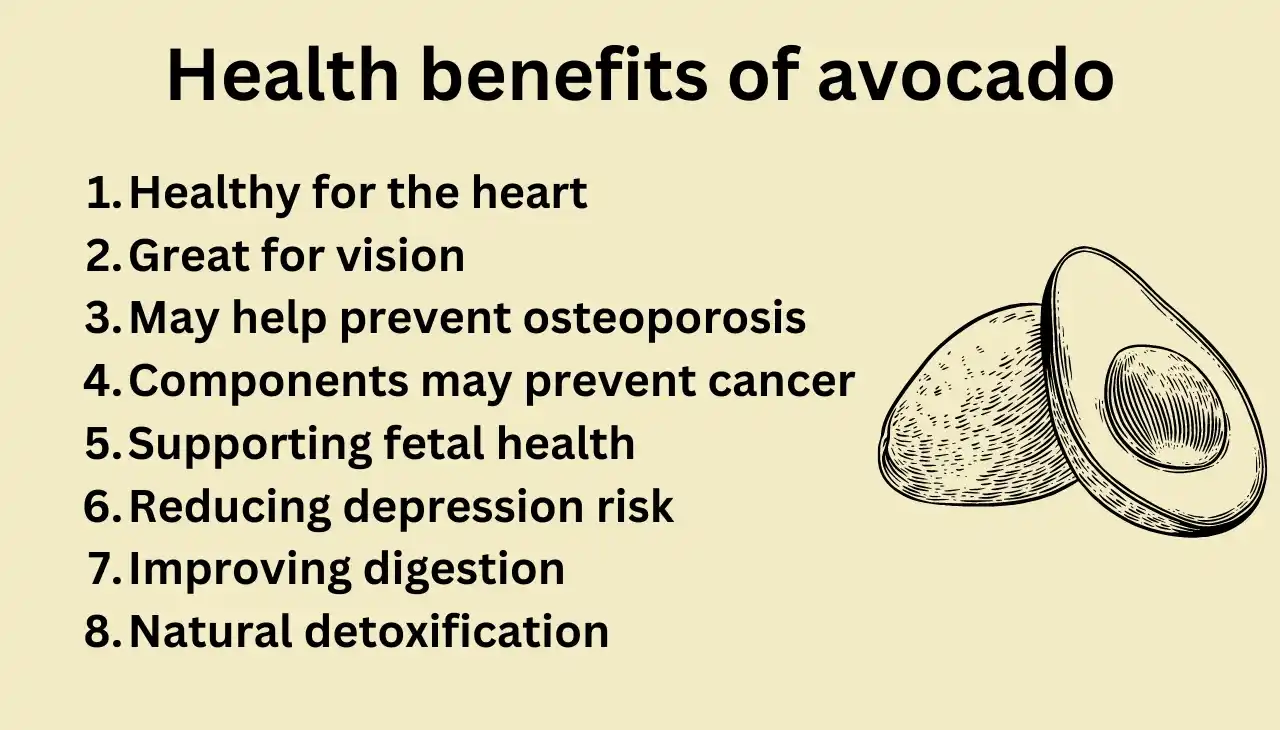
Avocado benefits for skin
Avocados are fantastic for skin health!
- Hydration: Avocados are rich in healthy fats and vitamins, which help to deeply moisturize and nourish the skin, keeping it soft and hydrated.
- Soothes Skin Conditions: Avocados’ lipids, compounds, and vitamins can aid accelerate skin regeneration and alleviate chronic skin disorders such as eczema and acne.
- Prevents Skin Damage: Avocados include antioxidants such as vitamins C and E, that help protect your skin from oxidative harm caused by the sun and other external factors.
- Improves Skin Elasticity: The monounsaturated fats in avocados can help increase skin elasticity and reduce the appearance of wrinkles.
- Minimizes Breakouts: Avocado oil has antimicrobial properties that can help reduce breakouts and keep your skin clear.
- Overall Skin Health: Avocado oil is rich in antioxidants, plant sterols, omega-9, minerals, and vitamins, which can boost collagen production, soothe inflammation, and promote a healthy, radiant complexion.
- Prevents Dry Skin: Avocados are a great source of biotin, a B vitamin that helps prevent dry skin and keeps it looking healthy.
Avocado benefits for men
Avocados offer several health benefits specifically for men. Here are some key advantages:
- Heart Health: Avocados are rich in monounsaturated fats, which help lower bad cholesterol (LDL) and increase good cholesterol (HDL), reducing the risk of heart disease.
- Sexual Health: Nutrients like vitamin E, vitamin B6, and folate in avocados support hormone production, improve sperm motility, and enhance blood flow, which can boost sexual health.
- Nutrient Absorption: The healthy fats in avocados help absorb fat-soluble vitamins like A, D, E, and K, ensuring you get the most out of your diet.
- Weight Management: The fiber and healthy fats in avocados promote satiety, helping control appetite and support weight management.
- Eye Health: Avocados include lutein and zeaxanthin, which are antioxidants that promote eye health and may lower the risk of age-related macular degeneration.
- Bone Health: They provide vitamin K, which is essential for bone health as it helps in calcium absorption and bone mineralization.
- Cancer Prevention: Some studies suggest that the phytochemicals in avocados may help prevent the growth of certain cancers.
- Digestive Health: High in fiber, avocados support a healthy digestive system and can help prevent constipation.
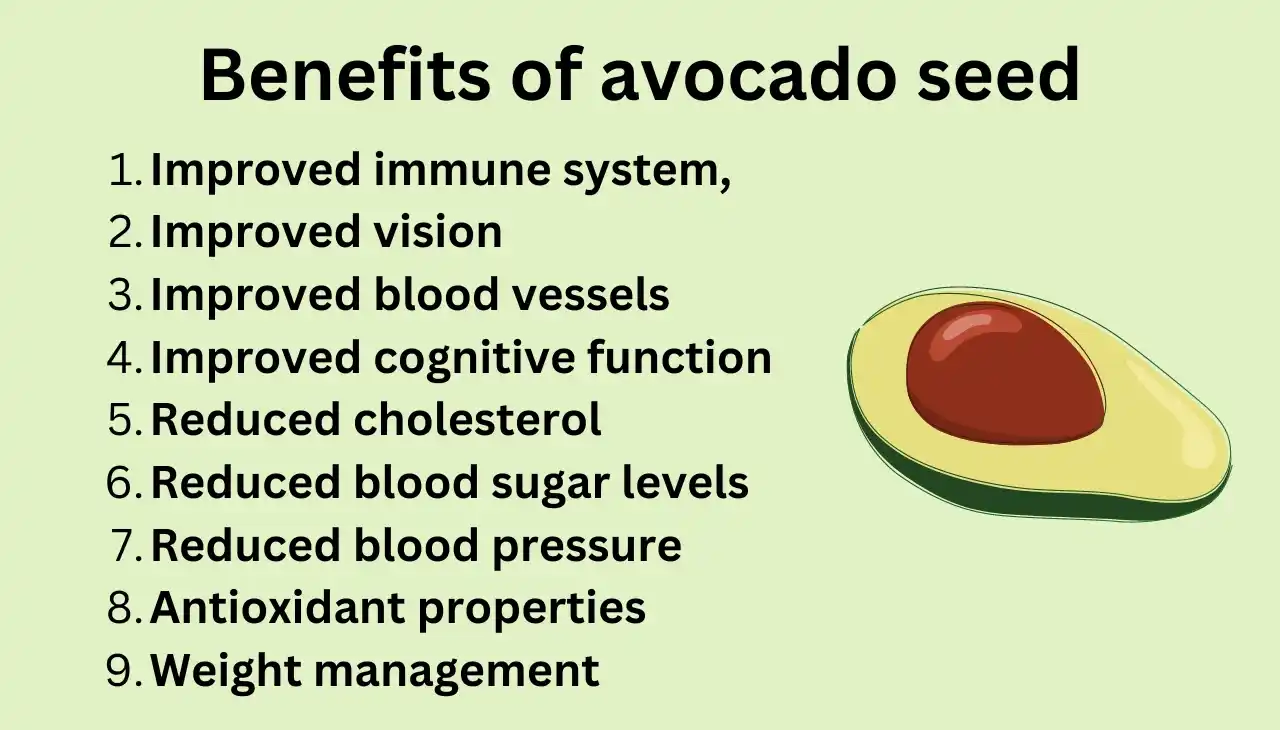
Avocado benefits for females
Avocados offer numerous health benefits for females. Here are some key advantages:
- Hormonal Balance: The healthy fats in avocados support hormone production and balance, which can be particularly beneficial during menstrual cycles and menopause.
- Skin Health: Rich in vitamins C and E, avocados help maintain healthy, glowing skin by reducing inflammation and promoting skin repair.
- Pregnancy Support: Avocados are high in folate, which is crucial for fetal development and can help prevent birth defects.
- Bone Health: They provide vitamin K, which is essential for bone health as it helps in calcium absorption and bone mineralization.
- Heart Health: The monounsaturated fats in avocados help reduce bad cholesterol (LDL) and increase good cholesterol (HDL), promoting heart health.
- Weight Management: The fiber and healthy fats in avocados promote satiety, helping control appetite and support weight management.
- Digestive Health: High in fiber, avocados support a healthy digestive system and can help prevent constipation.
- Eye Health: Avocados include lutein and zeaxanthin, which are antioxidants that promote eye health and may lower the risk of age-related macular degeneration.
- Anti-Inflammatory Properties: The antioxidants and healthy fats in avocados help reduce inflammation in the body, which can be beneficial for overall health.
- Nutrient Absorption: The healthy fats in avocados help absorb fat-soluble vitamins like A, D, E, and K, ensuring you get the most out of your diet.
Benefits of avocado seed
Avocado seeds, often overlooked, have several potential health benefits.
- Antioxidant Properties: Avocado seeds are rich in antioxidants, which help combat oxidative stress and protect cells from damage.
- Anti-Inflammatory Effects: The seeds contain compounds that can help reduce inflammation in the body, which is beneficial for overall health.
- Digestive Health: High in fiber, avocado seeds can support a healthy digestive system and help prevent constipation.
- Heart Health: The seeds may help lower cholesterol levels and improve heart health by reducing bad cholesterol (LDL) and increasing good cholesterol (HDL).
- Blood Sugar Regulation: Some studies suggest that avocado seed extract can help manage blood sugar levels, which is beneficial for people with diabetes.
- Antimicrobial Properties: Avocado seeds have been found to possess antimicrobial properties, which can help fight off harmful bacteria and fungi.
- Cancer Prevention: The phytochemicals in avocado seeds may help prevent the growth of certain cancers.
- Weight Management: The fiber in avocado seeds can promote satiety, helping control appetite and support weight management.
If you’re considering incorporating avocado seeds into your diet, it’s important to prepare them properly. Typically, they are dried, ground into a powder, and added to smoothies or other dishes.
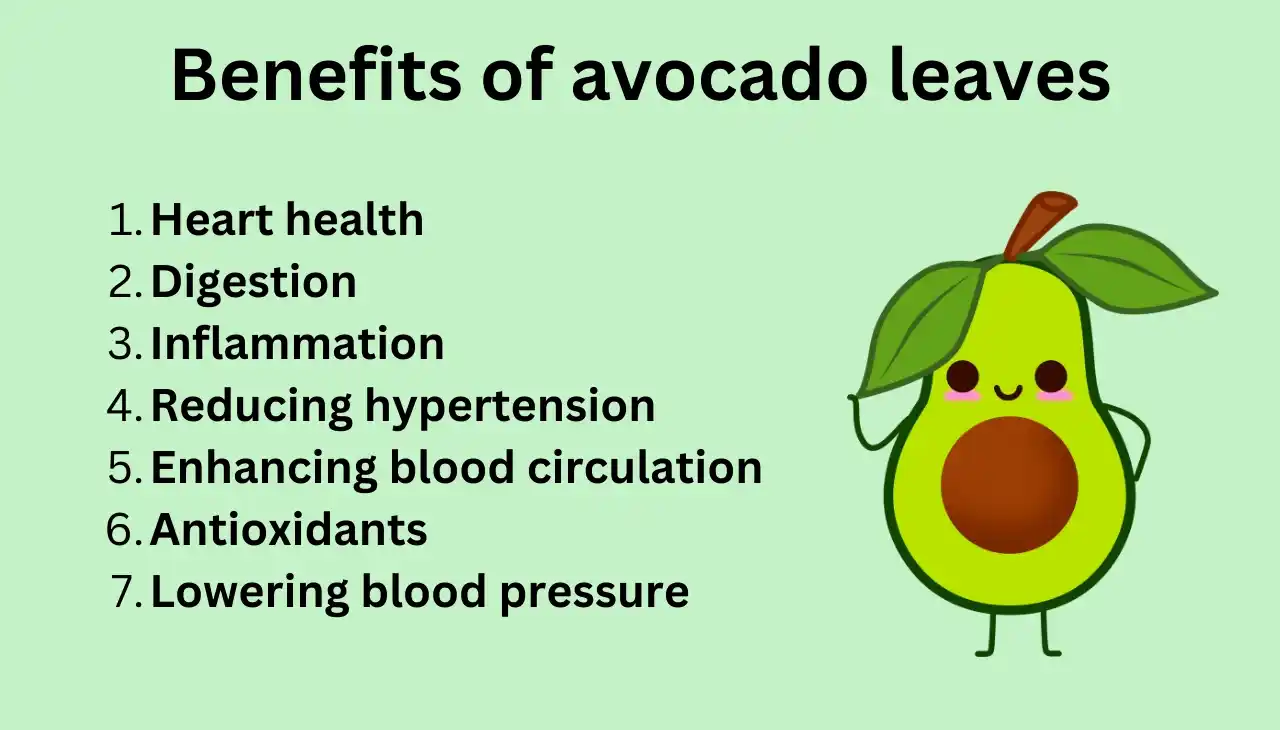
Benefits of avocado leaves
Avocado leaves are packed with nutrients and offer several health benefits.
Antioxidant Properties: Avocado leaves are rich in antioxidants like quercetin and polyphenols, which help combat oxidative stress and protect cells from damage.
- Anti-Inflammatory Effects: The leaves contain compounds that can help reduce inflammation in the body, which is beneficial for overall health.
- Digestive Health: High in fiber, avocado leaves support a healthy digestive system and can help prevent constipation.
- Heart Health: The leaves may help lower cholesterol levels and improve heart health by reducing bad cholesterol (LDL) and increasing good cholesterol (HDL).
- Blood Sugar Regulation: Some studies suggest that avocado leaf extract can help manage blood sugar levels, which is beneficial for people with diabetes.
- Kidney Health: Avocado leaf tea contains alkaloids, flavonoids, and saponins, which may help break down kidney stones.
- Anti-Microbial Properties: Avocado leaves have been found to possess antimicrobial properties, which can help fight off harmful bacteria and fungi.
- Weight Management: The fiber in avocado leaves can promote satiety, helping control appetite and support weight management.
- Skin Health: The antioxidants and anti-inflammatory properties of avocado leaves can improve skin health and reduce signs of aging.
- Respiratory Health: The leaves can help reduce symptoms of asthma and other respiratory conditions due to their anti-inflammatory effects.
If you’re considering using avocado leaves, they can be brewed into a tea, added to soups, or used in facemasks and hair treatments.
Benefits of avocado sexually
Avocados contain nutrients that may support sexual health and vitality, including:
- Vitamin B6: May help women get in the mood by reducing PMS symptoms like bloating, fatigue, and irritability.
- Monounsaturated fats: Can lower bad cholesterol levels and reduce the risk of heart attack and stroke, which can help men’s hearts function properly so blood can reach their sex organs.
- Fiber and healthy fats: Can help people feel full and maintain a healthy body weight, which may increase libido and sexual performance.
- Vitamin E: Can enhance blood flow and support nerve function, which may contribute to sexual arousal and performance.
- Potassium: Can support cardiovascular health and promote energy levels, which may benefit sexual stamina.
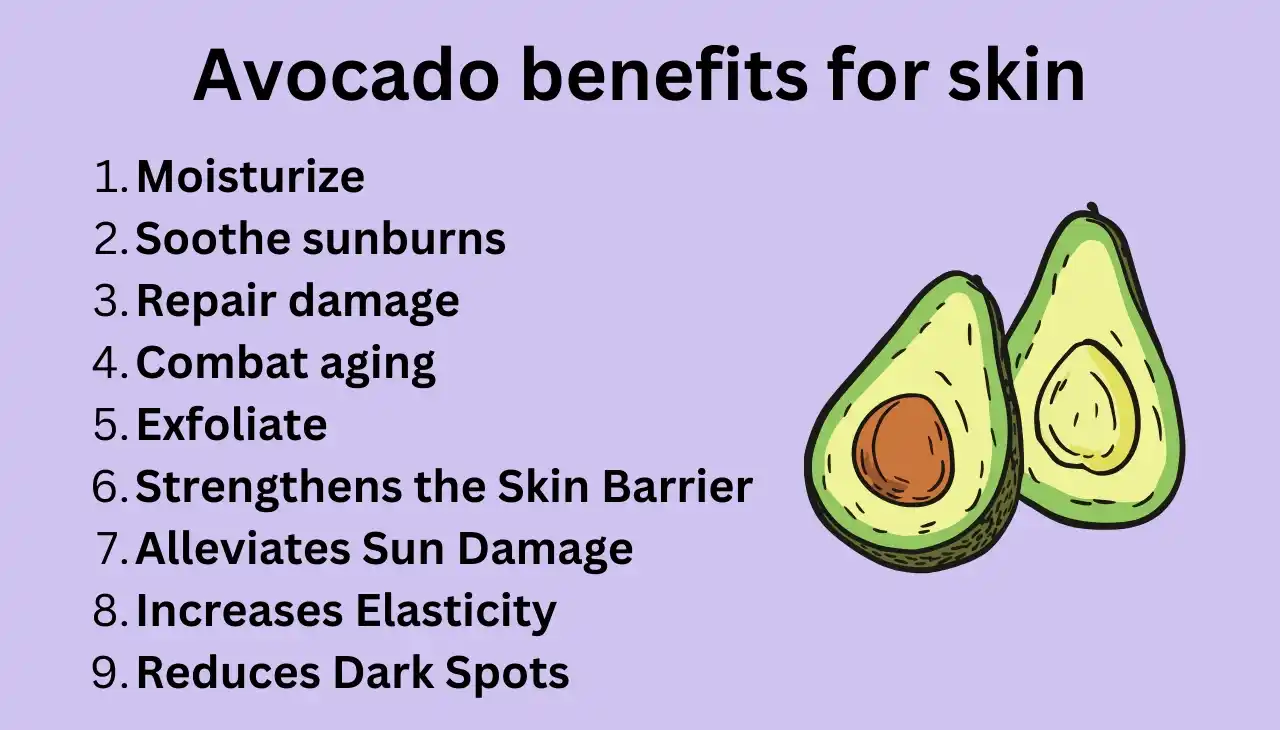
Overall benefits of avocado
- Nutritional Value of Avocado
- One-third of a medium avocado contains 26% of the Daily Value (DV) of Vitamin K, 20% of Folate, 17% of Vitamin C, 14% of Potassium, 14% of Vitamin B5, 13% of Vitamin B6, and 10% of Vitamin E.
- Avocados also provide smaller amounts of magnesium, manganese, copper, iron, zinc, phosphorus, and vitamins A, B1, B2, and B3.
- A 100-gram serving of avocado contains 485 milligrams of potassium, compared to 358 milligrams in a banana.
- Avocados are high in calories, but most come from heart-healthy monounsaturated fats. They also provide about 7 grams of fiber per 100-gram serving.
- Avocados’ Impact on Heart Health
- Avocados are rich in monounsaturated fats, particularly oleic acid, which can lower LDL cholesterol and increase HDL cholesterol.
- A study found that overweight and obese adults who ate one avocado per day had lower LDL cholesterol levels.
- Avocado-eating individuals also had higher levels of lutein, an antioxidant linked to better eye and heart health.
- High potassium content in avocados helps regulate blood pressure, a major risk factor for heart attacks, strokes, and kidney disease.
- Regular avocado consumption is associated with a lower risk of metabolic syndrome, including high blood pressure, high blood sugar, excess body fat, and abnormal cholesterol levels.
- Avocado for Weight Management
- High calorie content of avocados can aid in weight loss due to their unique combination of fats and fiber.
- Avocados provide soluble and insoluble fiber, slowing digestion and promoting fullness and satisfaction.
- A study found adding half an avocado to lunch increased feelings of satiety and reduced desire to eat.
- Monounsaturated fats in avocados boost metabolism, aiding in daily calorie burning.
- Avocados aid in nutrient absorption from other foods, maximizing the nutritional value of the meal.
- Digestive Health Benefits of Avocados
- Fiber for Digestive Function: Avocados’ fiber content aids in digestion by adding bulk to stool, preventing constipation, and supporting a healthy microbiome.
- Prebiotic Properties: Avocados contain compounds that promote the growth of beneficial gut bacteria, promoting better digestion, stronger immunity, and improved mood and mental health.
- Gentle on the Stomach: Avocados’ creamy texture makes them easy to digest and less likely to cause acid reflux compared to acidic fruits.
- Avocados’ Anti-Inflammatory Properties
- Rich in antioxidants like lutein, zeaxanthin, and beta-carotene.
- Neutralizing harmful free radicals, this helps to reduce oxidative stress and inflammation.
- Contains phytosterols, which reduce inflammation, beneficial for conditions like osteoarthritis.
- Studies show an extract of avocado and soybean oils can significantly reduce symptoms of knee osteoarthritis.
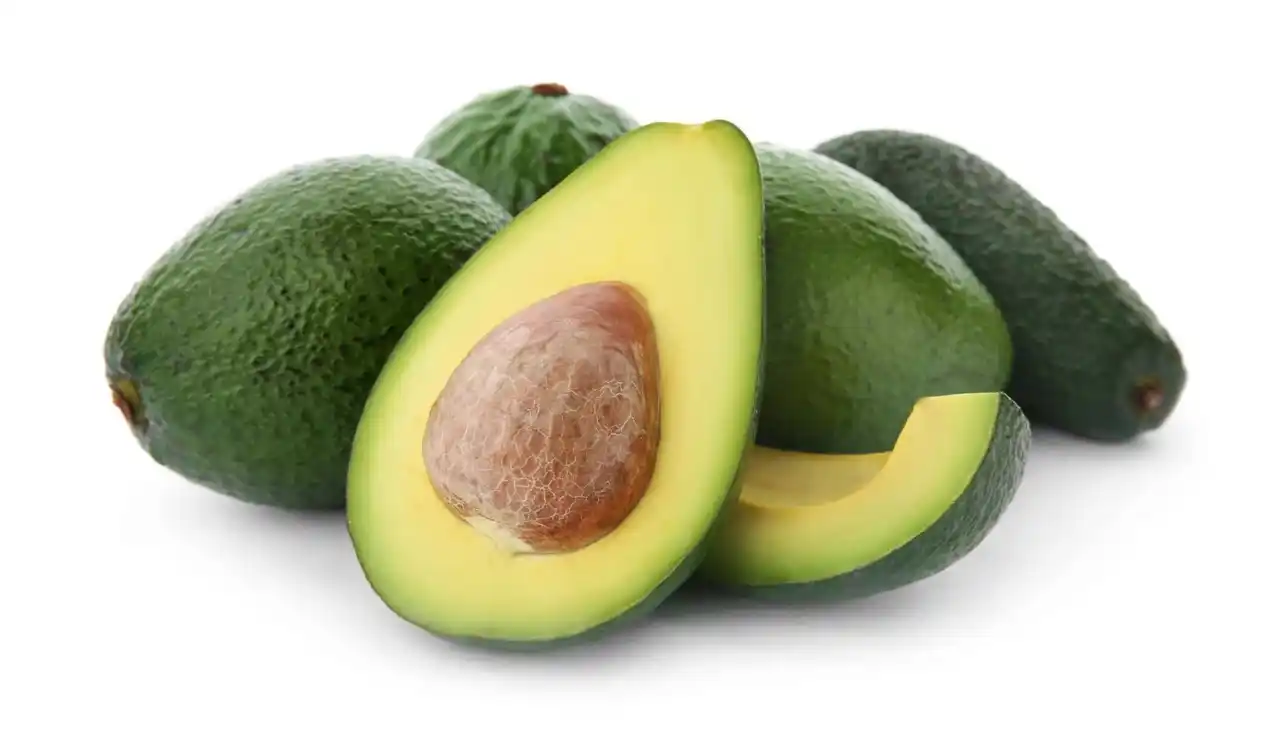
- Avocado Antioxidants for Eye Health
- Avocados are packed with lutein and zeaxanthin, powerful antioxidants that act as natural sun blocks for the eyes. These antioxidants are found in high concentrations in the retina, helping to protect our vision.
- Age-Related Macular Degeneration Prevention: Consumption of lutein and zeaxanthin reduces risk of cataracts and age-related macular degeneration, common eye problems in older adults.
- Brain Health Benefits of Avocados
- Monounsaturated fats in avocados support healthy blood flow and fat-soluble vitamins.
- Avocados are a good source of folate, a B vitamin essential for brain function.
- Adequate folate intake is linked to lower risk of depression and cognitive decline in older adults.
- High vitamin K content in avocados may benefit memory, with higher levels indicating better memory performance.
- Avocados: Immune System Boosting Benefits
- Vitamin C: Provides essential vitamin C for immune function, stimulating white blood cell production and function.
- Vitamin E: Supports immune function by protecting cells from damage, crucial for maintaining a strong immune system.
- B Vitamins: B6, folate, and pantothenic acid are essential for energy production, aiding in fighting infections and maintaining overall health.
- Avocado Leaves and Seeds Benefits
- Avocado seeds are rich in antioxidants and fiber, potentially having anti-inflammatory and antimicrobial properties.
- Avocado leaves are used in making tea, believed to have health benefits like relief from high blood pressure and inflammatory conditions.
- Caution: Large amounts of these seeds and leaves may contain harmful compounds, so consult a healthcare professional before using them for medicinal purposes.
How to Incorporate More Avocado into Your Diet
Now that you know all about the amazing health benefits of avocados, you might be wondering how to eat more of them. Here are some delicious ideas:
- Avocado toast: Mash avocado onto whole-grain toast and top with a sprinkle of salt and pepper.
- Guacamole: Mix mashed avocado with diced onion, tomato, cilantro, lime juice, and salt for a classic dip.
- Smoothies: Add half an avocado to your morning smoothie for extra creaminess and nutrition.
- Salads: Slice avocado and add to your favorite salad for a boost of healthy fats.
- Egg dishes: Top scrambled eggs or an omelet with sliced avocado.
- Sandwiches and wraps: Use mashed avocado as a spread instead of mayo.
- Pasta sauce: Blend avocado with herbs and lemon juice for a creamy, dairy-free pasta sauce.
- Baking: Replace butter with mashed avocado in baked goods for a healthier twist.
Why avocado is not good for you
While avocados are generally very healthy, there are a few reasons why they might not be suitable for everyone:
- High Caloric Content: Avocados are calorie-dense due to their high fat content. Consuming them in big numbers might cause weight gain if not balanced with other food components.
- Allergies: Some people may have an avocado allergy, which can cause symptoms ranging from mild itching to severe reactions. Additionally, those with latex allergies might also react to avocados.
- Kidney Issues: Avocados are high in potassium, which is beneficial for most people but can be problematic for those with kidney disease who need to limit potassium intake.
- Medication Interactions: The high vitamin K content in avocados can interfere with blood-thinning medications like warfarin, affecting their efficacy.
- Digestive Issues: Eating too many avocados can lead to digestive issues such as bloating or upset stomach due to their high fiber content.
It’s all about moderation and understanding your body’s specific needs.
Avocados are killing you?
While avocados are generally very healthy, it’s important to consume them in moderation. Here are some reasons why excessive consumption might not be ideal:
- High Caloric Content: Avocados are calorie-dense due to their high fat content. Eating too many can lead to weight gain if not balanced with other dietary components.
- Allergies: Some people may have an avocado allergy, which can cause symptoms ranging from mild itching to severe reactions. Additionally, those with latex allergies might also react to avocados.
- Kidney Issues: Avocados are high in potassium, which is beneficial for most people but can be problematic for those with kidney disease who need to limit potassium intake.
- Medication Interactions: The high vitamin K content in avocados can interfere with blood-thinning medications like warfarin, affecting their efficacy.
- Digestive Issues: Eating too many avocados can lead to digestive issues such as bloating or upset stomach due to their high fiber content.
It’s all about moderation and understanding your body’s specific needs.
Conclusion
Avocados are a unique combination of healthy fats, vitamins, and minerals that contribute to overall well being. They support heart health, boost brain function, and manage weight. Avocados are a versatile and delicious option for a balanced diet, but moderation is key. Incorporate avocados into meals to improve digestion and manage weight.
FAQ:
Can eating avocados help me lose weight?
While it might seem counterintuitive due to their high calorie content, avocados can actually support weight loss efforts. The combination of healthy fats and fiber in avocados helps you feel full and satisfied, potentially reducing overall calorie intake. A study found that adding half an avocado to lunch increased feelings of satiety and reduced the desire to eat for hours afterward. However, it's important to remember that avocados are calorie-dense, so portion control is key. Incorporate them as part of a balanced diet and overall healthy lifestyle for the best weight management results.
I've heard avocado seeds are beneficial. Is it safe to eat them?
While avocado seeds do contain antioxidants and fiber, their safety for consumption is still under debate. Some studies suggest potential anti-inflammatory and antimicrobial properties, but more research is needed to fully understand both the benefits and risks. Currently, there's not enough evidence to recommend eating avocado seeds regularly. If you're curious about trying them, it's best to consult with a healthcare professional first. Remember, the fruit itself offers plenty of proven health benefits, so you're not missing out by sticking to the creamy green flesh!
Can avocados help with my arthritis symptoms?
Avocados may indeed help with arthritis symptoms due to their anti-inflammatory properties. They contain compounds called phytosterols, which have been shown to reduce inflammation. Interestingly, a study found that a combination of avocado and soybean oil extracts significantly reduced symptoms of knee osteoarthritis. Additionally, the antioxidants in avocados can help combat oxidative stress, which is associated with inflammation in conditions like arthritis. While avocados shouldn't replace prescribed treatments, incorporating them into your diet might provide some additional relief.
I'm allergic to latex. Can I safely eat avocados?
If you have a latex allergy, you should be cautious with avocados. There's a condition called Latex-Fruit Syndrome, where people allergic to latex may also react to certain fruits, including avocados. This is due to similar proteins found in both latex and these fruits. Symptoms can range from mild (like itching in the mouth) to severe allergic reactions. If you have a known latex allergy, it's best to consult with an allergist before consuming avocados. They can perform tests to determine if it's safe for you to eat them.
How can I keep my avocados from turning brown so quickly?
The browning of avocados is due to oxidation when the flesh is exposed to air. Here are a few tips to keep your avocados fresh: 1. Leave the pit in: If you're only using half an avocado, keep the pit in the unused half. 2. Use lemon juice: Brush the exposed flesh with lemon juice; the citric acid helps prevent browning. 3. Store properly: Place the avocado in an airtight container or wrap tightly with plastic wrap. 4. Use water: Store the cut avocado in a container filled with water, flesh side down. 5. Onion trick: Store the avocado with a chunk of onion; compounds in the onion help prevent oxidation. Remember, some browning is natural and doesn't mean the avocado has gone bad. If the brown layer is thin, you can simply scrape it off and enjoy the green flesh underneath.




